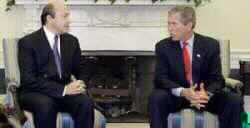HIGHLIGHTS: Resolution Could Be Ready for Discussion Wednesday||Russia Still Opposes Threat of War||Iraq Moves Troops into Civilian Areas in Anticipation of a Surprise U.S. Air Attack||Iraqi Vice President, Ramadan, Says Baghdad's Inspection Offer is Sincere|| Story: Britain told Security Council members Friday that any resolution calling on Iraq to cooperate with weapons inspectors must contain a credible threat, a Western diplomat said.
In a council meeting late Friday, Britain's U.N. Ambassador Jeremy Greenstock said the U.N. measure needed to include a potent response should Baghdad not honor the U.N. action, a Western diplomat said, on condition his name not be used.
The diplomat said that a resolution could be ready for discussion on Wednesday.
To pass, any resolution must be approved by at least nine members of the 15-member council. All five permanent members - the United States, Russia, Britain, France, and China - must be among those approving.
Under growing international pressure, Iraq on Monday announced it would accept the unconditional return of international weapons inspectors nearly four years after they left. The United States said the move was designed to divide the Security Council.
In Washington, President Bush appealed Friday by phone to a reluctant Russian President Vladimir Putin to back the resolution threatening Iraq with war if it does not destroy its weapons stockpiles.
Bush has said that Iraq has disregarded the 16 resolutions against it since its invasion of Kuwait in August 1990, and warned that if the Security Council cannot coerce compliance, the United States will.
The diplomat said Britain's Greenstock explained that Iraq must be made aware it faces a threat if it continues to flout the U.N. demands.
Any first draft of a resolution will be tough, and negotiations will determine just how tough, a British official said.
IRAQI FORCES MOVE TO CIVILIAN AREAS
Iraq has moved small numbers of military forces into civilian areas in what some Pentagon officials interpret as a precaution against a possible surprise U.S. aerial attack, officials said Thursday.
The officials, who discussed the matter on condition of anonymity, said it appeared Iraq believed these forces would be spared in a short-notice U.S. attack because of the high risk of civilian casualties.
The dispersal of forces was not, however, on the large scale that Pentagon officials would expect to see if Iraq were anticipating an imminent American-led coalition attack, the officials said
The movement of forces was alluded to by Defense Secretary Donald H. Rumsfeld on Wednesday, although he cast it in a different light. He said it indicated Iraq hoped to attract U.S. attacks on civilian buildings such as hospitals and schools in order to fan the flames of anti-Americanism.
IRAQ: INSPECTION OFFER IS SINCERE
Iraq's decision to allow the unconditional return of U.N. inspectors is a "sincere move" that will confirm the country has destroyed all banned weapons, a top Iraqi official was quoted as saying Thursday.
Iraqi Vice President Taha Yassin Ramadan said the government had destroyed all banned weapons "over the past years."
U.N. inspectors will have "the chance to know for certain and from close up that Iraq is clear of weapons of mass destruction," he said.
Baghdad's offer is "a sincere move which would expose the U.S. administration's false claims on Iraq," Ramadan said, according to the state-run al-Iraq newspaper.
PHOTO CAPTION
President George W. Bush meets with Russian Foreign Minister Igor Ivanov(L) in the Oval Office of the White House September 20, 2002. Bush is hoping to coax Moscow into joining his campaign against Iraqi President Saddam Hussein. (Kevin Lamarque/Reuters)
- Author:
& News Agencies - Section:
WORLD HEADLINES


 Home
Home Discover Islam
Discover Islam Quran Recitations
Quran Recitations Lectures
Lectures
 Fatwa
Fatwa Articles
Articles Fiqh
Fiqh E-Books
E-Books Boys & Girls
Boys & Girls  Women
Women










